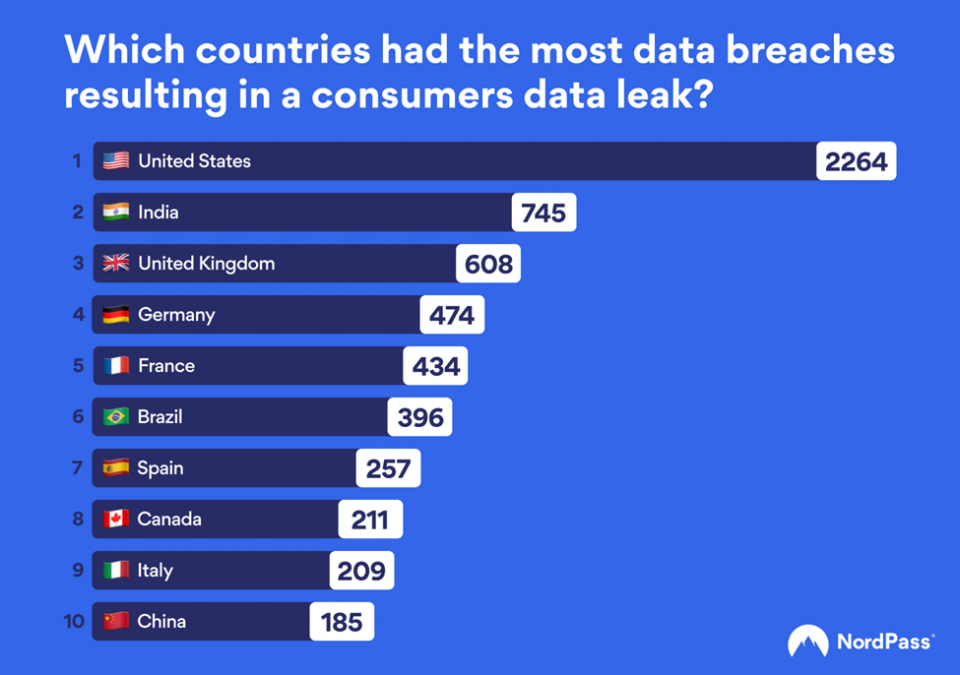Almost 750 Indian firms experienced data breaches exposing consumer data
Businesses in India have leaked consumers’ data more than most other countries, reveals the latest research by NordPass. Since late 2019, almost 750 companies in India have suffered data breaches during which various consumer data (e.g., email addresses, passwords, and usernames) was leaked. This places India in second position among countries with most client data leaks.
To conduct this study, NordPass partnered with independent third-party researchers who investigated which companies in India and other countries in terms of their industry, size, and type (i.e., private, non-profit) are failing to secure consumers’ data the most.
Countries with the most consumer data leaks
Of around 10,000 companies worldwide that are responsible for exposing clients’ data to hackers, 8% are based in India. In total, they have generated over $176 billion in revenue and had around 390.000 employees.
Globally, US companies experienced the most cyber incidents, which led to consumers’ data leaks, with almost 2,300 companies affected. Among the countries in the European Union (EU), Germany and France have experienced most cyber incidents, which led to customers’ data leaks.
“In a constantly challenged cyber environment, businesses no longer have the luxury to store consumer data in plain text on Excel or otherwise neglect basic cybersecurity practices. To avoid financial and reputational risks, companies should consider it their personal duty to ensure clients’ data is secured against online threats, even if the legislation is not there yet,” says Tomas Smalakys, the CTO of NordPass.
Tech companies are not so techy
Researchers found that educational organizations in India are the worst at ensuring clients’ data safety. While one would assume otherwise, consumer services and technology companies are also not much better, with these industries having experienced similarly many cybersecurity incidents and revealing clients’ data as a result.
Firms operating in business services, entertainment, and retail fields are also responsible for a significant portion of consumers’ data leaks in India.
Private companies are the number one target
In terms of organization’s type, private businesses in India were of most interest to hackers. Based on the study, they make up half of organizations that had their clients’ data stolen. Less so, cybercriminals have also targeted educational bodies (9%), solopreneur businesses (6%), public companies (5%), and other types of organizations.
Researchers have also concluded that smaller companies are more likely to experience a data breach and lose clients’ data as a result. In India, companies with 11-50 employees had their clients’ data compromised the most. Businesses having 51-200 employees were also highly affected.
How to secure clients’ data?
Despite intensifying cyber risks, many businesses, especially smaller ones, lack awareness on why they should and how they should secure clients’ data.
Setting up a cyber resilience plan and organizing employee training could be a good start, says Smalakys. Additionally, companies should consider network security solutions, such as business VPNs, that restrict unauthorized access to computing systems. They have proved to be an effective solution against malware and other malicious attacks.
Password management is another field to improve, says Smalakys. While many cybersecurity incidents happen simply due to compromised credentials, even the world’s biggest companies do not abandon poor password management practices, reveals an earlier study by NordPass. Up to 32% of their passwords contain a direct reference to the company, which is a gift to hackers.
To address this issue, Smalakys recommends adopting password managers, which allow people within the organization to store, manage, and share passkeys in an end-to-end encrypted space. In addition, companies can try out passkeys, the new alternative method of online authentication, currently considered the most secure alternative to passwords. Progressive companies, such as Google, Microsoft, Apple, PayPal, and KAYAK, already allow account access with passkeys.
Methodology: The study was conducted in partnership with independent researchers specializing in research of cybersecurity incidents. They looked for databases leaked from various organizations and analyzed them based on various criteria, such as country, industry, business type, size of the company, and data items’ type. The research represents the breaches that happened between December 2019 and July 2023.


